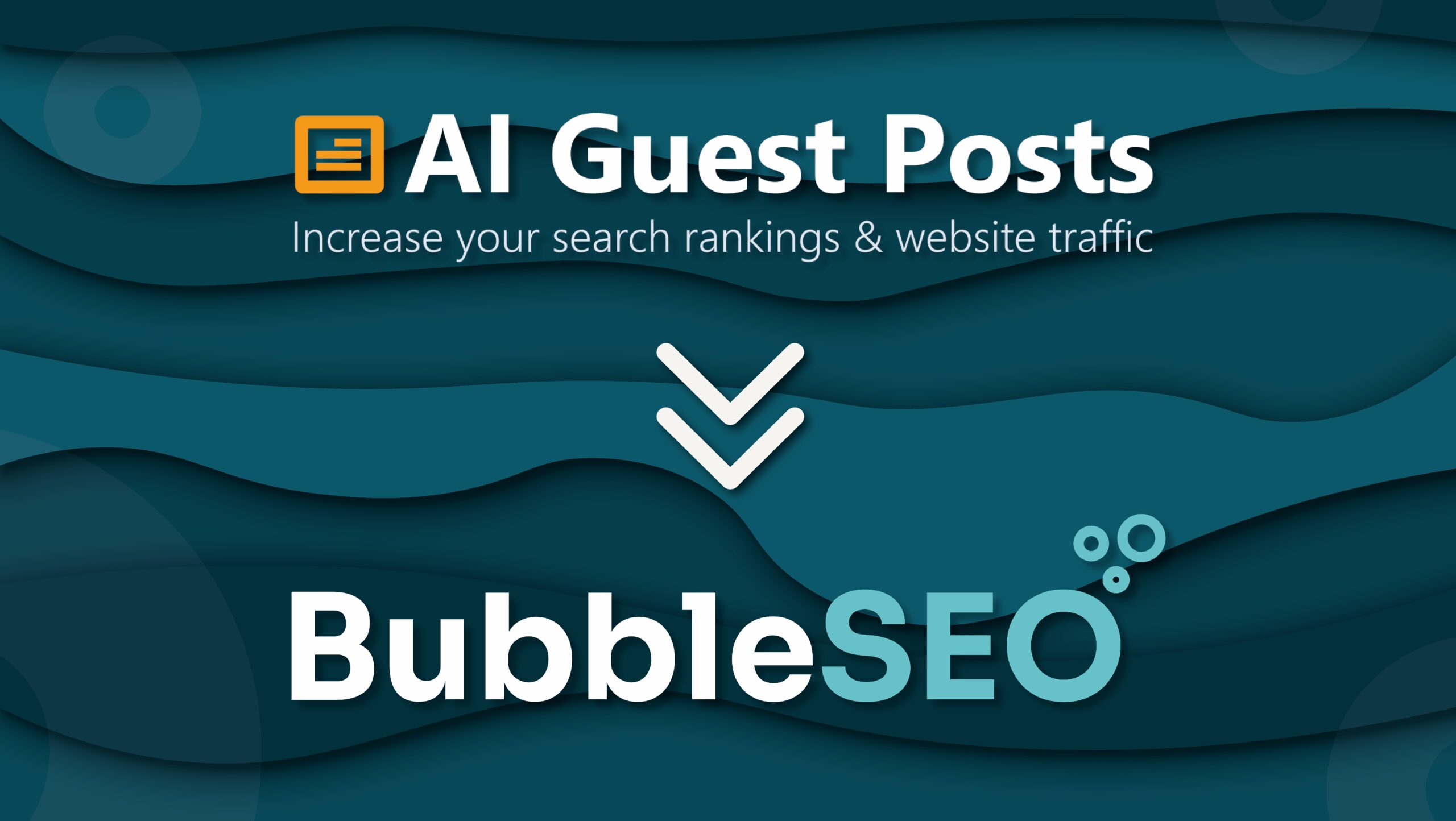
Digital marketing and SEO, paid guest posting has emerged as a powerful strategy

Looking for an overview of guest posting findings?

Welcome to The Ultimate Guide to Guest Posting!
We are going to visit the journey of guest posting, including the most important stages and what they entail. This includes, research, creating keywords, finding a suitable audience, buying a guest post and then publishing and tracking your results. This article is all about the beginning of the guest posting journey and stages your should consider when starting a guest post.
If you would like any help in your guest posting journey, we would be more than happy to talk about some guest post opportunities at AI Guest Posts. We would love to share more information about our platform or our 12 individual brands that are available for guest posts.
Simply drop us an email at [email protected] or take a look at our platform BubbleSEO.
Grow your business online with content marketing solutions from Bubble SEO today.
Place An Order
One of the most common goals within marketing is to rise through the ranks and be on page one of Google, Bing or Ask.com, but how is this achieved?

We're excited to announce that AI Guest Posts has undergone a transformative rebranding and is now known as Bubble SEO. This strategic move has allowed the business to develop within the digital landscape and highlight our commitment to providing digital marketing solutions tailored to enhance online visibility and engagement for our customers. Bubble SEO remains dedicated to delivering high-quality, targeted content and effective SEO solutions that align with evolving digital marketing trends. Here is a little more information about our brand and its services. Our services: At Bubble SEO, we specialise in three core services, with content writing being a new feature to the website: Guest Posting: Which aims to enhance your online presence with high-quality guest posts on authoritative websites, driving traffic and boosting your SEO rankings. Link Building: Helps build a robust backlink profile with strategic link building services that improve your website's authority and visibility. Content Writing: Provides engaging content for your audience with compelling content tailored to your brand voice and SEO needs. Benefits of Bubble SEO: We have now made changes to the booking process to simplify this, and updated the customer dashboard section in the hope to improve our existing values below: Enhanced Service Quality: With our rebranding comes a renewed focus on delivering top-notch services that exceed your expectations. Improved User Experience: Our new website offers a streamlined interface, making it easier for you to navigate and access our services. Expanded Network: Benefit from our expanded network of partner websites, ensuring broader outreach and better opportunities for your business. Loyalty Rewards: As a token of our appreciation for the continued support of our bookers, we have now introduced loyalty rewards: Exclusive Discounts: Enjoy special discounts as a loyal Bubble SEO customer, with the more points you acquire, the more exciting offers you will unlock. We're thrilled about this new chapter as Bubble SEO and look forward to continuing to be your trusted partner in achieving your digital marketing goals. Stay tuned for more exciting updates and announcements! Discover the new Bubble SEO and elevate your online presence today! Jennifer Hobson – Digital Marketing [email protected] Heather Ryan – Business Development [email protected]

Creating engaging and optimised content is crucial for driving traffic and achieving higher rankings on search engines.

Search Engine Optimisation (SEO) is often viewed as a complex and ever-changing field, but its core principles remain constant. If you're looking to increase your website's visibility, generate traffic, and climb the search engine ranks, understanding the foundational elements of SEO is critical. This article will unlock the secrets of SEO, covering essential topics like link building, content marketing, and optimising for search engine rankings. 1. The Foundation of SEO: Why It Matters At its core, SEO is about making your website more visible to search engines like Google, Bing, or Yahoo. The higher your site ranks on search engine results pages (SERPs), the more likely users are to visit your site. Why does this matter? Studies show that over 75% of users never scroll past the first page of search results, making it crucial to rank as high as possible. 2. The Power of Content Marketing Content marketing is a central part of any successful SEO strategy. Search engines prioritise websites that regularly publish high-quality, relevant content. This not only helps with ranking but also establishes your brand as an authority in your industry. Focus on High-Quality Content: Google’s algorithms reward websites that produce in-depth, well-researched content. Blogs, case studies, infographics, and videos that provide real value to your audience are more likely to rank well. Consistency is Key: Regularly updating your website with fresh content signals to search engines that your site is active and valuable. Use Targeted Keywords: When creating content, make sure to incorporate keywords that your audience is searching for. Tools like SEMrush or Google Keyword Planner can help identify relevant keywords with high search volume. 3. Link Building: The Backbone of SEO Link building is one of the most important ranking factors for search engines. It involves getting other reputable websites to link back to your content, signaling to search engines that your site is authoritative and trustworthy. Earn Quality Backlinks: Focus on earning backlinks from credible, high-authority sites within your industry. Guest posting on blogs, securing mentions in industry publications, and creating shareable resources are great ways to attract backlinks. Avoid Low-Quality Links: Links from spammy or irrelevant sites can harm your rankings. Always aim for quality over quantity when building links. Internal Linking: Don’t overlook the power of internal links. By linking to other relevant pages on your website, you improve your site’s structure, making it easier for both users and search engines to navigate. 4. On-Page SEO: Optimising Each Page On-page SEO involves optimising individual pages on your site to help search engines understand and rank your content. Title Tags and Meta Descriptions: Your title tag is one of the first things search engines and users see. Make sure your primary keyword is included. Meta descriptions, while not a direct ranking factor, improve click-through rates when they are engaging and relevant. Headers (H1, H2, H3): Break your content into readable sections using headers, which help both users and search engines digest the material. Image Optimisation: Use descriptive alt text for images and compress them to ensure your page loads quickly, another critical ranking factor. 5. Technical SEO: Enhancing Site Performance Beyond content and links, technical SEO is crucial for ensuring your site is easy to crawl, secure, and optimised for all devices. Mobile Optimisation: As more users search on mobile devices, Google now considers mobile-friendliness a key ranking factor. Use responsive design to ensure your site looks great and functions well on mobile. Site Speed: Slow-loading sites frustrate users and are penalised by search engines. Tools like Google PageSpeed Insights can help you improve load times. Crawlability and Indexing: Make sure your site is easy for search engines to crawl and index. Submit an XML sitemap to Google Search Console, and fix any errors that may block search engines from accessing your content. 6. Search Engine Ranks: Climbing the SERPs The ultimate goal of SEO is to rise to the top of search engine ranks. But getting there takes time, effort, and the right strategy. Track Your Progress: Use tools like Google Analytics, Moz, or Ahrefs to monitor your search rankings and track organic traffic over time. This will help you identify what’s working and what needs improvement. Competitor Analysis: Regularly check in on your competitors to see how they’re performing in search results. Understanding their strategies can reveal opportunities for your own SEO improvement. Continuous Optimisation: SEO isn’t a one-time task—it requires regular adjustments. Keep up with the latest trends and algorithm updates to ensure your site remains optimised for long-term success. 7. The Future of SEO SEO is always evolving, and staying ahead of the curve is crucial for maintaining your search rankings. With the rise of artificial intelligence, voice search, and new ranking factors like Core Web Vitals, it’s more important than ever to stay informed about SEO developments. Focus on user experience, creating valuable content, and building authoritative links to future-proof your SEO strategy. Conclusion SEO doesn’t have to be a mystery. By focusing on key areas like content marketing, link building, and technical SEO, you can unlock the secrets to improving your search engine rankings. SEO is a long-term investment, but with a clear strategy and consistent effort, you’ll start seeing the rewards in higher rankings, increased traffic, and greater visibility for your brand. Master the essentials of SEO today and watch your website soar to new heights!

With lots of changes in the digital world, ensuring that your content reaches your target audience is equally crucial.

The world of SEO is constantly evolving, and staying on top of the latest trends is critical to maintaining online visibility and driving traffic. As we move through this year, some key SEO shifts have emerged that are reshaping the way businesses approach search engine optimisation. Whether you're a content creator, business owner, or digital marketer, these are the SEO trends you can't afford to overlook. 1. Link Building is Evolving Link building remains a core component of SEO, but it's becoming more sophisticated. Google’s algorithms are placing a greater emphasis on the quality and relevance of backlinks rather than sheer quantity. Building relationships with authoritative websites through guest posting and earning editorial links are now essential strategies for creating strong, natural backlink profiles. The focus should be on acquiring links that are relevant to your niche and will offer real value to users. 2. The Power of Content Continues to Grow Quality content is still king, but search engines are becoming smarter about recognising well-researched, authoritative, and relevant information. SEO now demands content that not only addresses user queries but also provides a deeper, more engaging experience. Guest posting is an effective way to distribute this high-quality content, enabling brands to reach new audiences while securing valuable backlinks. 3. User Experience (UX) and SEO Are Now Inseparable With the introduction of Google's Core Web Vitals, the overall user experience has become a critical ranking factor. Fast loading times, mobile-friendliness, and smooth navigation are now essential for SEO success. This means that your site must not only be optimised for search engines but also deliver an excellent user experience to keep visitors engaged. 4. Voice Search Optimisation Voice search is growing rapidly with the increased use of smart speakers and mobile assistants like Siri and Alexa. To stay competitive, SEO strategies need to accommodate more natural, conversational language that aligns with how people use voice search. This trend emphasises the importance of long-tail keywords and question-based content. 5. The Rise of AI in SEO AI-powered tools and algorithms are influencing SEO in unprecedented ways. Google's AI algorithm, RankBrain, helps determine the most relevant search results based on user intent, making it critical to understand the audience’s needs and craft content accordingly. SEO professionals must now consider how AI-driven features, like natural language processing and predictive search, will impact their strategies. 6. Local SEO Becomes More Prominent Local SEO continues to grow in importance, especially for small businesses. Google My Business listings, reviews, and local citations now play a significant role in helping companies appear in location-based searches. If you haven't yet optimised your site and content for local searches, this trend can no longer be ignored. The SEO landscape is always in flux, and staying on top of these trends is crucial for maintaining a competitive edge. Whether through advanced link building, guest posting, improving user experience, or leveraging AI, businesses need to adapt their strategies to the evolving digital ecosystem. By focusing on quality and relevance in every aspect of SEO, you’ll be better positioned for long-term success in search rankings.